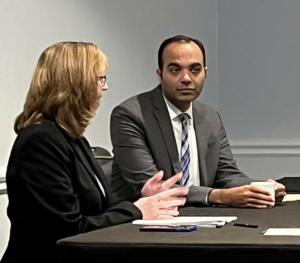The May 2023 WBA Compliance Journal is now available. In this edition, readers will find an article covering recently issued guidance by FDIC, CFPB, and OCC, each of which identify activities expected to be a focus of upcoming compliance examinations. Readers will also find an article highlighting an interagency statement and an interim final rule regarding the transition from US LIBOR. The publication also includes a summary of recently published agency rules and notices, other important compliance-related updates, and a WBA Education Calendar which lists upcoming training events.
Posts
 By Rose Oswald Poels
By Rose Oswald Poels
Last Thursday, the Bureau of Consumer Financial Protection (CFPB) issued its long-awaited final Section 1071 business data collection rule. The Wisconsin Bankers Association (WBA) has been engaged in the rulemaking process since the proposal’s inception. While I know the general requirements for this rule came directly from the Dodd-Frank Act, CFPB chose to add in many more data points than what the law required which have made this rule very burdensome for the banking industry and intrusive for banks’ small business customers.

Just this past fall, I, along with several Wisconsin bankers, shared specific concerns of the proposal directly with CFPB Director Rohit Chopra. I am disappointed our concerns were largely disregarded given the requirements within the final rule. Our concerns of data privacy for small business customers remain.
Given the low threshold for rule applicability, the amount of data to be collected and reported, and the changes in process that will need be implemented, the rule will be burdensome to implement. While I and the WBA Legal team are currently working through the final rule and accompanying resources, below are highlights of the final Section 1071 rule. WBA will certainly be hosting educational events and will be creating resources around the final rule in the forthcoming months.
Highlights
- The final rule applies to banks that originated at least 100 covered originations in both of the two previous years.
- “Small business” means one with gross revenue of $5 million or less in the preceding fiscal year.
- Small businesses will be able to self-identify as women-, minority-, or LGBTQI+ owned.
- Lenders will be able to rely on financial and other information provided by the small business applicant.
- Mandatory compliance dates are staggered based upon the number of covered originations made by each bank, in particular:
- A bank must begin collecting data and otherwise complying with the final rule on October 1, 2024, if it originated at least 2,500 covered originations in both 2022 and 2023.
- A bank must begin collecting data and otherwise complying with the final rule on April 1, 2025, if it:
- Originated at least 500 covered originations in both 2022 and 2023;
- Did not originate 2,500 or more covered originations in both 2022 and 2023; and
- Originated at least 100 covered originations in 2024.
- A bank must begin collecting data and otherwise complying with the final rule on January 1, 2026, if it originated at least 100 covered originations in both 2024 and 2025.
As mentioned above, the CFPB has created resources which accompany the final rule. The resources include an executive summary, quick reference guides, and a data point chart.
WBA Creates Transfer by Affidavit Guide
 By Scott Birrenkott
By Scott Birrenkott
When an individual dies and leaves property subject to administration in Wisconsin, there are several types of estate procedures which can be followed. One such method involves the use of a form known as a Transfer by Affidavit (sometimes referred to as a Small Estate Affidavit). The Transfer by Affidavit is often a popular option due to its simplicity and ease of use. Because of this, Wisconsin banks are likely to encounter individuals seeking to use this form to close out accounts.
It is important to remember that a bank should not be advising or recommending anyone use a Transfer by Affidavit Form — or any other particular method to wrap up an estate. When a customer dies, the decedent’s family, attorney, or other party acting as the executor must determine the appropriate method. Estate matters can be quite complex, and the Transfer by Affidavit is not the only method available. Oftentimes, a relative of the decedent may come to the bank asking for advice on how to administer an estate. However, it is important that bankers know to refer these individuals to an attorney.
A Transfer by Affidavit may only be used for estates having a value of $50,000 or less (but again, note that it is not the only option available for small estates).
The individual who presents a Transfer by Affidavit is known as an “affiant.” There are four categories of affiants who may use a Transfer by Affidavit, that being an heir, trustee, person who was guardian at the time of the decedent’s death, and a person named in the will to act as a personal representative. As with all aspects of the Transfer by Affidavit, the affiant must determine their capacity and represent it on the form — not a banker. By completing the Transfer by Affidavit, the affiant makes various statements — under oath — regarding the property, and by accepting the decedent’s property, the affiant assumes certain duties. Most of these duties do not concern the bank, but there are a couple matters which do.
First, if the affiant is a person named in the decedent’s will to act as personal representative, banks must wait 30 days before releasing the property. The reason for this waiting period is that if, within the 30-day period, the bank is presented with an affidavit for the same decedent from another person, then the bank is prohibited from releasing the property. Essentially, it is a waiting period in which other parties might express an interest in the property. If this happens, then the bank should not release the property until instructed to do so by court order.
Another responsibility the affiant has is to notify the state of Wisconsin if the decedent (and/or the decedent’s spouse) ever received the benefit of certain medical services. The Transfer by Affidavit Form includes a section related to these services and, if the decedent (or spouse) received such benefits, or the affiant does not know, then the affiant must send notice to the state and provide receipt of that notice to the bank before receiving property. If the affiant does not provide this receipt, the bank cannot release the property.
Oftentimes, the Wisconsin Bankers Association (WBA) is asked certain questions such as: must a bank verify the affiant’s status (e.g., as an heir)? Or, what if the affiant lies or is mistaken regarding the property or other duties? These questions, and others, can be answered by considering the statutory protections received by banks releasing property to the affiant. That is, Wisconsin law provides for release of liability of the transferor of the property. Meaning, liability protections for the bank. This protection is contingent on the above conditions, but in general, banks should consider that by signing the Affidavit Form, the affiant certifies that the contents of the Affidavit are true and correct. Unless the bank, for some reason, had actual knowledge that an affiant was lying or otherwise misrepresenting information (e.g., the affiant describes property as being under $50,000 but bank knows for a fact that the estate holds property over $50,000), then the bank is not required to verify the information beyond what the statute otherwise requires.
While the above serves as a brief overview of Wisconsin’s Transfer by Affidavit Form, there are some additional nuances worth considering which are beyond the scope and format of this article. However, WBA recently created a Transfer by Affidavit Guide which goes into greater detail regarding the form, who may use it, how it may be used, along with a discussion of the law, step-by-step instruction for reviewing the form, and a question-and-answer section. This guide may be found on WBA’s website within the compliance resources section at wisbank.com/resources/compliance.
For any questions regarding the Transfer by Affidavit Form, or other topics, contact WBA legal at wbalegal@wisbank.com or 608-441-1200. Additional compliance resources, including Q&A’s, can be found by visiting wisbank.com/resources/compliance.
As spring arrives, so does the March 2023 WBA Compliance Journal. In this edition, WBA Legal covers upcoming changes to FDIC’s deposit insurance rules, FinCEN’s alert on the nationwide surge in mail theft-related check fraud schemes, and a Wisconsin Supreme Court decision which upheld Wisconsin’s long-established rules for priority under receivership rules. The publication also includes a summary of recently published agency rules and notices and other important compliance-related updates for bankers, including links to FRB’s Bank Term Funding Program resources and changes made to FDIC’s Section 19 rules as a result of the Fair Hiring in Banking Act.
Banks should consider document type, purpose, relevant issues
By Scott Birrenkott
Q: What name should banks use for customers when completing documents?
A: The name that should appear, and be signed, on documents depends on a few things. Primarily, the type of documents being signed, the purpose for which the customer’s name is appearing, and any relevant rules.
Typically, a customer has a single, consistent name which will appear on documents, disclosures, and other communications and match their signature. However, there are situations where this is not the case. A customer might use inconsistent capitalization, or go by different names, such as a “nickname,” or perhaps use their middle initial in some situations, or a “Jr.” or “Sr.” designation. There may also be situations where a customer changes their name, either because of a marriage, or other situation — such as a change in identity or gender transition — and a change from an individual’s “deadname.”
Banks should consider how various types of documentation can be affected. For example, if opening a checking account, the specimen signature is important to verifying transactions on the account. If a customer provides a specimen signature which does not match the signature they intend to use on checks, that can result in a question as to whether certain items are authorized. For this reason, the signature card should match the name the customer intends to use when authorizing transactions and should be updated if a change occurs.
When entering into a contract, best practice would be using the customer’s legal name, as provided by customer. The customer should sign in a manner by which they intend to be bound. There are no specific standards for a signature, other than that it reflects the party’s intent to be bound. For example, a customer might sign in a manner different from the way their name otherwise appears on documentation, such as whether they use a middle initial in their signature or not. Or how they capitalize their signature, or whether they are able to sign their name at all and perhaps can only make a mark or symbol such as a checkmark or “X.”
Banks must consider whether the documents properly identify its customer, and whether the signature affixed to the document reflects a valid contract. In this regard, it is ultimately a matter of policy and preference, but a best practice recommendation would be for the bank to be consistent in how the name appears throughout all the documentation, and the signature itself.
However, when it comes to Uniform Commercial Code (UCC) financing statements, there are specific rules which must be followed. This article does not delve into the specifics, but banks should consider that for filing UCC financing statements, the filing should reflect the debtor’s exact name as required by Wis. Stat. section 409.503.
For any questions regarding customer names, accuracy of UCC financing statements, or other topics, contact WBA legal. Additional compliance resources can be found at wisbank.com/resources/compliance.
 By Rose Oswald Poels
By Rose Oswald Poels
Happy New Year! As we step into 2023, there are several thresholds which have been adjusted by both state and federal regulators which go into effect now that the new year has arrived. Below is a collection of thresholds effective January 1, 2023, including a link to pull each publication for reference.
- Based upon the annual percentage increase in the CPI-W as of 06/01/2022, the exemption threshold for Regulation Z (Truth in Lending Act) will increase to $66,400, up from $61,000.
- Based upon the annual percentage increase in the CPI-W as of 01/01/2022, the exemption threshold for Regulation M (Consumer Leasing Act) will increase to $66,400, up from $61,000.
- Based on the CPI-W in effect as of 06/01/2022, the exemption threshold under Regulation Z for HPML appraisals will increase to $31,000, up from $28,500.
- Based on the 8.6 percent increase in the average of the CPI-W for the 12-month period ending in November 2022, the asset-size threshold to be exempt from collecting HMDA data in 2023 is adjusted to $54 million, up from $50 million.
- The dollar amount of the maximum allowable charge for disclosures by a consumer reporting agency (CRA) to a consumer pursuant to FCRA section 609 for the 2023 calendar year is $14.50.
- The asset-size threshold which exempts creditors from the requirement to establish an escrow account for HPMLs will be:
- For creditors and their affiliates that regularly extended covered transactions secured by first liens, the asset-size threshold is adjusted to $2.537 billion, up from $2.336 billion; and
- The exemption threshold for certain insured depository institutions with assets of $10 billion or less is adjusted to $11.374 billion, up from $10.473 billion.
- Based on the CPI-W in effect as of 06/01/2022, the dollar amount thresholds for HOEPA and QM-related loans have been adjusted as follows:
- For HOEPA loans, the adjusted total loan amount threshold for high-cost mortgages will be $24,866.
- The adjusted points-and-fees dollar trigger for high-cost mortgages will be $1,243.
- For QMs under the General QM loan definition in § 1026.43(e)(2), the thresholds for the spread between the annual percentage rate (APR) and the average prime offer rate (APOR) will be:
- 2.25 or more percentage points for a first-lien covered transaction with a loan amount greater than or equal to $124,331;
- 3.5 or more percentage points for a first-lien covered transaction with a loan amount greater than or equal to $74,599 but less than $124,331;
- 6.5 or more percentage points for a first-lien covered transaction with a loan amount less than $74,599;
- 6.5 or more percentage points for a first-lien covered transaction secured by a manufactured home with a loan amount less than $124,331;
- 3.5 or more percentage points for a subordinate-lien covered transaction with a loan amount greater than or equal to $74,599; or
- 6.5 or more percentage points for a subordinate-lien covered transaction with a loan amount less than $74,599.
- For all categories of QMs, the thresholds for total points and fees will be:
- 3 percent of the total loan amount for a loan greater than or equal to $124,331;
- $3,730 for a loan amount greater than or equal to $74,599 but less than $124,331;
- 5 percent of the total loan amount for a loan greater than or equal to $24,866 but less than $74,599;
- $1,243 for a loan amount greater than or equal to $15,541 but less than $24,866; and
- 8 percent of the total loan amount for a loan amount less than $15,541.
- For open-end consumer credit plans under TILA, the threshold that triggers requirements to disclose minimum interest charges will remain unchanged at $1.00.
- Based upon the CPI-W, the CRA regulation has adjusted the asset-size thresholds used to define “small bank” and “intermediate small bank” to be:
- Small bank means a bank that, as of December 31 of either of the prior two calendar years, had assets of less than $1.503 billion.
- Intermediate small bank means a small bank with assets of at least $376 million as of December 31 of both of the prior two calendar years and less than $1.503 billion as of December 31 of either of the prior two calendar years
- The DFI has established the interest rate that must be paid on required escrow accounts under section 138.052(5) of the Wisconsin Statutes. The new rate is 0.11%.
- The FDIC Designated Reserve Ratio remains 2 percent for 2023.
- The OCC assessment rates are reduced for the general assessment fee schedule. OCC has maintained assessment rates from 2022 for the independent trust and independent credit card fee schedules. Also, there is no inflation adjustment to assessment rates.
- Contribution limit for employees who participate in 401(k), 403(b), most 457 plans, and the federal government’s Thrift Savings Plan is increased to $22,500, up from $20,500. The limit on annual contributions to an IRA increased to $6,500, up from $6,000.
- Multifamily loan purchase caps for Fannie Mae and Freddie Mac will be $75 billion for each enterprise, for a combined total of $150 billion. The caps reflect an anticipated contraction of the multifamily originations market this year. FHFA will require that at least 50 percent of Fannie’s and Freddie’s multifamily business be mission-driven affordable housing.
- The conforming loan limit values for mortgages to be acquired by Fannie Mae and Freddie Mac in 2023 for one-unit properties will be $726,200, an increase from $647,200.
- New loan limits for FHA’s Single Family Title II Forward and Home Equity Conversion Mortgage (HECM) insurance programs, based upon property size and location, range from $472,030 to $3,142,800.
I am looking forward to this new year and excited about what 2023 may bring. Be sure to stay connected with WBA through our various releases and publications, and through our social media channels.
Banks should consider document type, purpose, relevant issues
By Scott Birrenkott
Q: What Name Should Banks Use for Customers When Completing Documents?
A: The name that should appear, and be signed, on documents depends on a few things. Primarily, the type of documents being signed, the purpose for which the customer’s name is appearing, and any relevant rules.
Typically, a customer has a single, consistent name which will appear on documents, disclosures, and other communications and match their signature. However, there are scenarios where this is not the case. A customer might use inconsistent capitalization, or go by different names, such as a “nickname,” or perhaps use their middle initial in some situations, or a “Jr.” or “Sr.” designation. There may also be situations where a customer changes their name, either because of a marriage, or other situation — such as a change in identity or gender transition — and a change from an individual’s “deadname.”
Banks should consider how various types of documentation can be affected. For example, if opening a checking account, the specimen signature is important to verifying transactions on the account. If a customer provides a specimen signature which does not match the signature they intend to use on checks, that can result in a question as to whether certain items are authorized. For this reason, the signature card should match the name the customer intends to use when authorizing transactions and should be updated if a change occurs.
When entering into a contract, best practice would be using the customer’s legal name, as provided by customer. The customer should sign in a manner by which they intend to be bound. There are no specific standards for a signature, other than that it reflects the party’s intent to be bound. For example, a customer might sign in a manner different from the way their name otherwise appears on documentation, such as whether they use a middle initial in their signature or not. Or how they capitalize their signature, or whether they are able to sign their name at all and perhaps can only make a mark or symbol such as a checkmark or “X.”
Banks must consider whether the documents properly identify its customer, and whether the signature affixed to the document reflects a valid contract. In this regard, it is ultimately a matter of policy and preference, but a best practice recommendation would be for the bank to be consistent in how the name appears throughout all the documentation, and the signature itself.
However, when it comes to Uniform Commercial Code (UCC) financing statements, there are specific rules which must be followed. This article does not delve into the specifics, but banks should consider that for filing UCC financing statements, the filing should reflect the debtor’s exact name as required by Wis. Stat. section 409.503.
For any questions regarding customer names, accuracy of UCC financing statements, or other topics, contact WBA legal. Additional compliance resources can be found at wisbank.com/resources/compliance.





